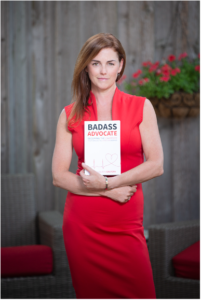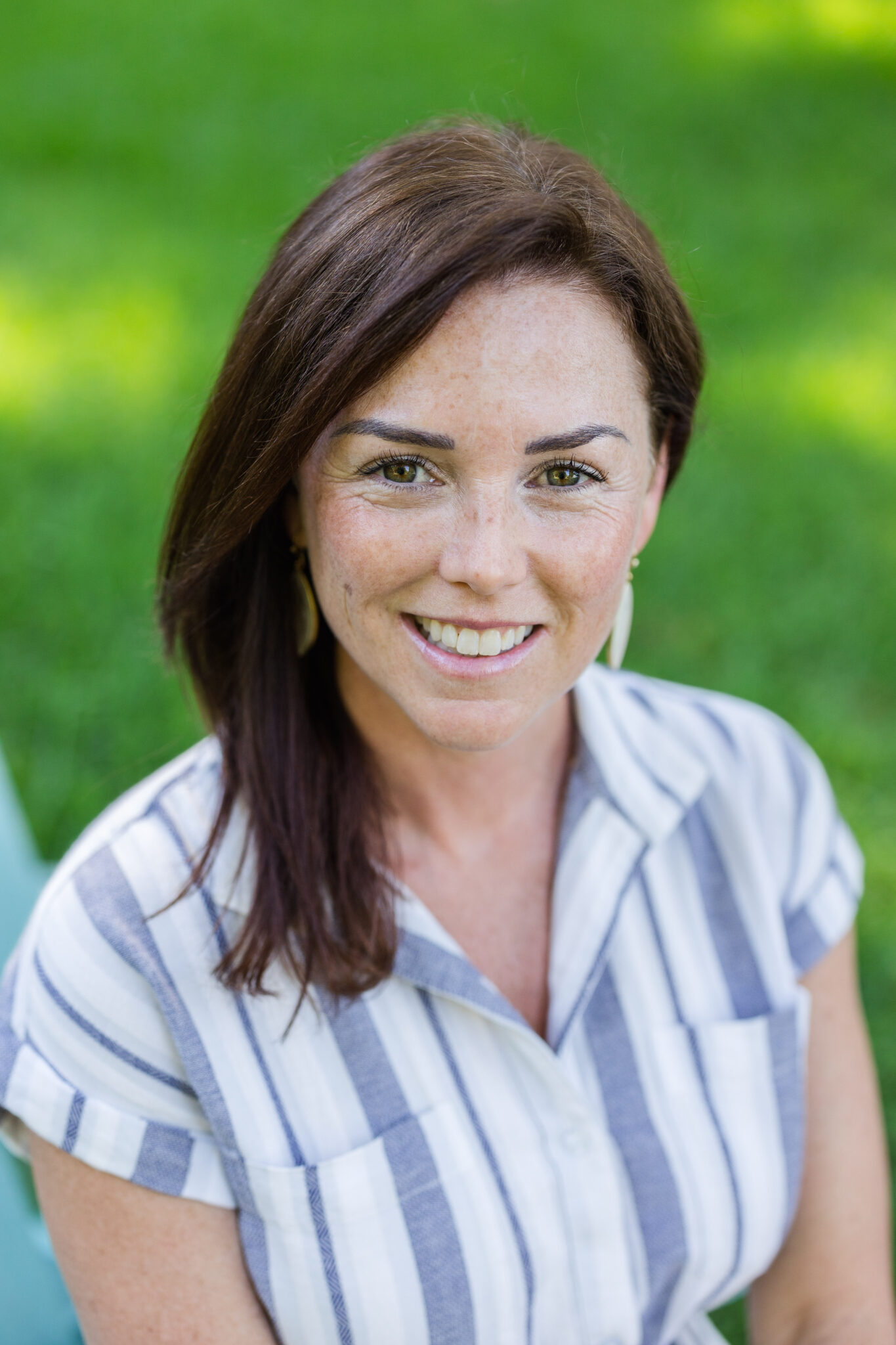An interview with Erin Galyean How to become a Badass Advocate on February 3, 2024 by George Ackerman, Ph.D, J.D.

Biography
Erin Galyean is a published author and professional speaker. In 2020, Erin published her first book Badass Advocate: Becoming the Champion Your Loved One Deserves. Badass Advocate, an information-packed and action-oriented book, teaches family caregivers how to lead the charge when dealing with a loved one’s health crisis. After losing her father, Mike, to Non-Hodgkin’s Lymphoma, Erin was determined to be an unstoppable advocate for her sister, Meghan who was also diagnosed with Non-Hodgkin’s Lymphoma and a rare lung disease. With over 20 years of experience in the pharmaceutical industry, Erin was able to use her professional knowledge to ensure her sister received the best care.
Today, Erin shares her heartbreaking life events and the lessons she learned so others can make a difference in their loved one’s healthcare experience. Her book, Badass Advocate includes 8 actionable strategies that are both effective and simple to follow. Erin also published a set of journals to help caregivers better balance self-care with patient care. Through her book, journals, and website (www.badassadvocate.com), Erin shares an abundance of valuable information that will teach families how to effectively navigate the challenges they face.
Please tell me a little about your background.
In 2017, my sister Meghan, whom I was very close to, was diagnosed with three diseases (Non-Hodgkin’s Lymphoma, an autoimmune disease, and a rare lung disease called Bronchiolitis Obliterans). Prior to these diagnoses, Meghan was a young, healthy, active mom of two little girls. She never smoked a cigarette in her life and prided herself on making healthy choices.
Meghan was a former Division 1 lacrosse and field hockey player. As a result of her passion for sports, she was heavily involved in bringing lacrosse to her community by coaching many young women and girls in the sport. Outside of her athleticism, Meghan was a kind, loving and easy-going human being.
As you would expect, this diagnosis was devastating and scary for my family – even more so because we lost our dad, Mike, to NHL in 1997. We’d already experienced this nightmare. The good news was that the cancer was curable; the bad news was that the lung disease she contracted was both rare and aggressive. That meant little was known about the disease and it would take its toll on her 5’2” body very quickly. The BO would end up taking Meghan’s life 13 months after her diagnosis.
As background, I’ve been in the pharmaceutical industry for over 20 years. Throughout Meghan’s illness, I used my professional knowledge to advocate for her and get her the best care possible.
After losing my sister, I needed to ensure that her death wasn’t in vain. So, in 2020, I published my first book, Badass Advocate: Becoming The Champion Your Loved One Deserves. In Badass Advocate, I share my story but, more importantly, I teach family caregivers how to lead the charge when dealing with a loved one’s health crisis. My strategies are based off of both my professional knowledge and personal experiences.
Since publishing my book, I have published a set of journals to help caregivers better balance self-care with patient care. I am almost ready to publish another journal, but this one is really unique. This one is for patients and their loved ones to explore together. It includes over 50 questions and some other fun prompts so they can make down times a little more enjoyable. I also have started writing my second book which I hope to finish in the next year.
Can you tell me more about your organization?
My goal is to help families, like mine, who are thrust into the awful situation of having a loved one diagnosed with a life-altering disease. Rarely are we prepared to be a caregiver or patient advocate. Even my friends who are doctors and nurses have shared with me that the situation is completely different when they are the patient or supporting their loved one.
My company is a one-woman show. I support families dealing with an illness by sharing what I’ve learned through my website (www.badassadvocate.com), podcast interviews, social media posts, and my blog. I also have spoken at various charity events to support those impacted by a particular disease.
What is your passion and how did you get involved in Parkinson’s awareness and hope for a cure?
My passion is patient advocacy regardless of the disease. I have been in the pharmaceutical industry my entire career, and, in the last 10+ years, I have been training sales people how to sell to physicians, nurses, mid-levels, and pharmacists. My favorite trainings focus on how to better communicate, connect, and adapt to healthcare providers. Once my sister got sick, I realize that these skills can be used not just to sell a product but also to advocate for a loved one.
My family also learned a lot when taking care of Meghan and I’ve continued to learn as friends and other family members have had illnesses. I am constantly thinking of ways we can better advocate for ourselves and other’s health.
I am confident that the tips and information I share will empower families and friends to be influential advocates.
What type of training and how long are the programs?
My sessions vary depending on what the person who requests or hires me wants. Typically, they last 20-60 minutes. But, no matter how long the programs last, my goal is to have anyone listen walk away feeling that they are empowered to make a difference in their loved one’s care.
What effect can it have on an individual with Parkinson’s?
My trainings can help others to understand how to advocate for themselves or someone with Parkinsons. My tips are simple yet effective.
What would you like to see as a future goal for your programs?
I would love to speak on a national stage like Ted Talks. Being a patient advocate is something that impacts all of us but gets little attention. The more people I can help the better. Every patient needs an advocate. Continuing to support families and patients during the toughest of times is always my number 1 goal!
What events do you participate in?
I’ve been a guest on several podcasts, spoken at charity events and at healthcare conferences.
How does this also assist the caregivers?
My advice is for anyone who is supporting a patient -sometimes that is a caregiver, sometimes that is the patient themselves and sometimes that is a family member or friend who isn’t the main caregiver but is still involved to some degree. Anyone can be an advocate on any day depending on the situation. We should all be knowledgeable about how to best advocate for ourselves and others when it comes to our health.
In your opinion what is the key to effective advocacy?
One of the keys is empathy for the patient and having the courage to speak up. When my sister was sick, I had the mindset that I wasn’t going to let my fear of stepping on someone else’s toes or the fear of insulting someone get in the way of getting her the best care possible. SHE was my number one priority.
This may mean making decisions (alongside the patient) that is best for them but that others don’t understand. Those decisions may make family members or friends upset.
I’m not saying we should be rude and aggressive towards others, quite the opposite. What I am saying is that sometimes we let our fears stop us from having a voice or doing what is best for the patient and that may impact our love one’s care.
Let’s be honest, we know our loved ones best. If they are acting strange – say it! If they are not feeling well – share that! If they don’t want visitors right now – then don’t allow visitors! Don’t hold back sharing your concerns or what is going because you don’t want to upset someone else. When it comes to healthcare professionals specifically, the more informed they are, the better they can do their job!
What other activities do you undertake to help improve and support your daily living Eg exercise and alternative remedies?
I exercise on average 5 day/week. I’m a pescetarian but mostly eat a vegetarian diet. I also aim to meditate, read, and write something I’m grateful for daily. All of these things keep my body healthy physically and mentally. Illness isn’t always within our control, but I do my best to control the controllables.
Why should people who don’t have Parkinson’s care about this?
Everyone will be impacted by the healthcare system at some point. We all need to know how to best advocate for ourselves or others.
Have you had any family members or relatives affected by Parkinson’s disease?
No
If you had one song that would tell us more about you or represent your life which song would it be?
This is a hard one – I’ll say Just Breathe by Pearl Jam. Reminds me of my experiences of losing two people whom I adore.
If you had one final statement or quote you could leave for the Parkinson’s community, what would it be?
“There are only four kinds of people in the world — those that have been caregivers, those that are caregivers, those who will be caregivers, and those who will need caregivers.” – Rosalynn Carter

